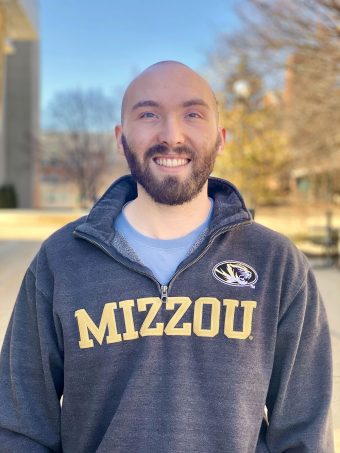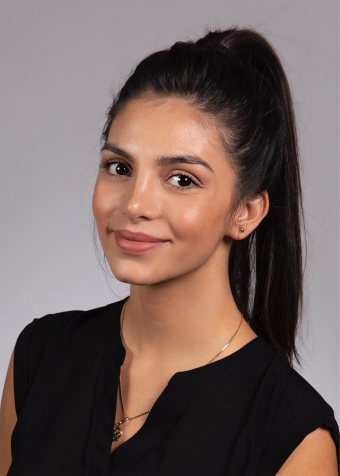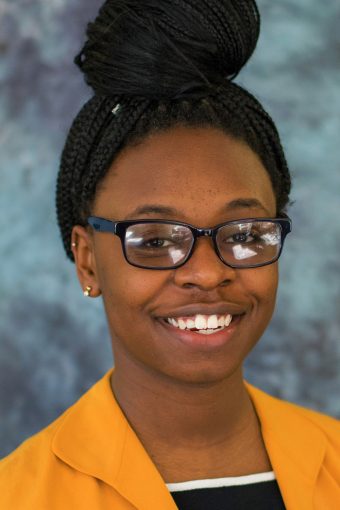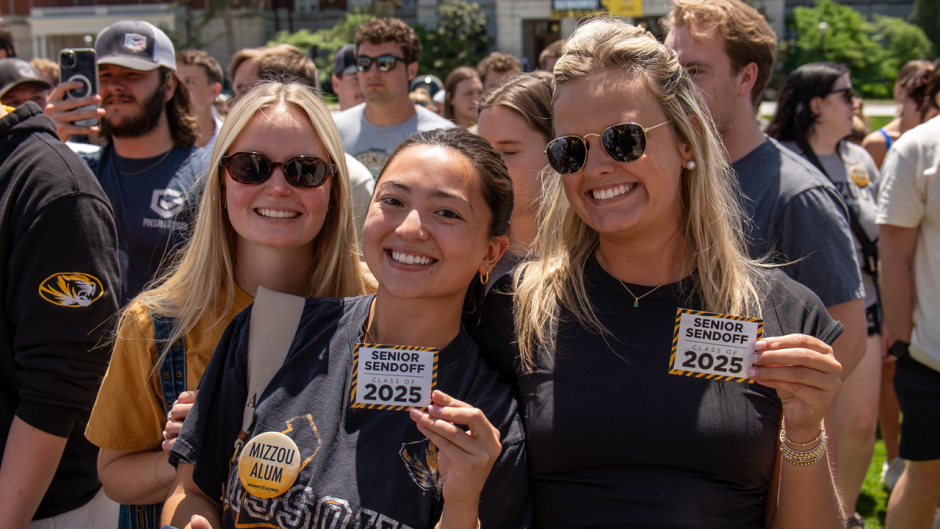March 17, 2021
Contact: Kenny Gerling, gerlingk@missouri.edu
When Derek Fiquet returned to the University of Missouri in 2019 to finish his degree in interdisciplinary studies, he still wasn’t sure what he wanted to do. After his sophomore year in 2015, he’d followed his passion for the outdoors and spent time as a river guide rafting around the U.S. and in the far north of Queensland, Australia. “I’ve seen really extreme weather across the world and heard from locals that this isn’t normal,” he said. “When I came back, I knew I was really interested in climate change, but I wasn’t sure what to do with it.”
One day after a biology class, Fiquet hung around to chat with Natalie Downer, the course’s instructor and, fortuitously, associate director of the McNair Scholars Program. It was a conversation that would change his life.
“I was trying to put myself out there and find out what to do, since I didn’t have an idea,” Fiquet said. “I told her maybe I should go to medical school. But she said, ‘Derek. Everything you’ve told me you care about — the environment, sustainability … That’s what you need to go into.’”
Downer suggested Fiquet look into graduate school and apply for the McNair Scholars Program, a federally funded TRiO program through the U.S. Department of Education — and administered at MU under the Division of Inclusion, Diversity and Equity. The program prepares undergraduate students from backgrounds traditionally underrepresented in graduate education for continued study. At Mizzou, McNair provides 29 students per year with funding, one-on-one faculty mentorship and staff support. McNair Scholars also attend weekly professional development workshops and monthly seminars, all geared toward providing resources for the successful completion and presentation of a research project.
Within a week, Fiquet applied for — and was soon accepted into — the McNair class of 2020-21.
Downer said that Fiquet was like many undergraduates she talks with who are unsure how to channel their interests into a field of study. It’s a challenge the program is designed to address. “McNair provides a very focused level of navigation and support,” she said. “We provide intentional resources that are tailored specifically to each of our students.”
Another path
McNair launched nationally in 1989. Mizzou was one of 14 universities chosen to administer the program, which is now at 187 universities in 47 states. To date, 181 of Mizzou’s McNair Scholars have gone on to earn doctoral degrees, and more than 300 have earned master’s degrees. The program’s participants have averaged 8 new doctoral degrees per year for the past 8 years.
Jeremy Bloss, McNair program coordinator, said he often introduces students to the idea of continuing beyond their bachelor’s. “I get to tell students there is another path,” he said. “Some of our students think college just means an undergraduate degree … I get to tell them that participating in McNair makes them strong candidates and will make graduate programs want them for a fully funded degree."
One of the students Bloss worked with is Nicole Terherst Amezcua. When Bloss first reached out, Terherst Amezcua was a part of TRiO SSS , a support program for students from underrepresented groups, and a little more than a year away from finishing her degree in interdisciplinary studies with emphases in international studies, business and environmental studies. Terherst Amezcua grew up in Branson, Missouri, but has family in the country of Mexico, which she said sparked her interest in water quality advocacy — a subject that wasn’t fully reflected in her coursework.
Over the course of multiple meetings, Bloss helped Terherst Amezcua shift her focus to natural sciences and identify a potential mentor: Damon Hall, assistant professor in the School of Natural Resources and Biomedical, Biological and Chemical Engineering.
“I hadn’t done any science before I met with Dr. Hall,” said Terherst Amezcua. “I wouldn’t have been able to do that if Jeremy [Bloss] hadn’t made those first connections.”
Hall agreed to be Terherst Amezcua’s mentor and introduced her to lab and field research. She’s now a first-year graduate student in the human dimensions of natural resources program at Mizzou and continues to work closely with Hall.
Hall said the McNair program — and the support its staff provides — makes for driven undergraduate researchers. “It’s like having another graduate student,” he said. “For faculty members, its great working with an undergraduate researcher who you know is going on to graduate school and has ambitions for doctoral education.”
Terherst Anezcua said she credits McNair with changing the course of her life. “It introduced me to people who believed in me and took a chance on a student who like many others, had no idea what she was doing or how to pursue a post-graduate academic journey,” she said. “They literally provided me with every resource I needed to succeed and then some.”
A legacy of excellence
McNair has also inspired additional programs that support student success through their time at Mizzou and beyond, said NaTashua Davis, director of McNair and executive director of access and leadership development in the Division of Inclusion, Diversity and Equity. She cited initiatives including Discover, a McNair-affiliated program that introduces freshmen and sophomores to graduate opportunities, and the Graduate Scholars of Excellence Program, which supports underrepresented doctoral students, as just a few of the resources indebted to McNair’s legacy. “The lasting effects of these programs is so important for us to recognize and appreciate,” she said. “That’s why we have so many alumni who reach out and let us know how they have been impacted.”
One of those successful alumni is KeLa Allen, a former McNair Scholar who graduated in 2019 with a degree in human development and family science and is now a first-year doctoral student at the University of Georgia. Allen, whose research focuses on how discrimination impacts educational outcomes for African American children, said she still draws on lessons learned during her year as a McNair Scholar.
“They push you to know what you’re talking about and to be the expert,” she said. “You have to learn your topic and have that confidence.”
Allen added that McNair’s small staff was responsive to questions, and even willing to stay late to help review applications for graduate school and to assist with scheduling appointments for the GRE. “Everyone in the office is willing to work with you,” she said.
Preparing for the future
Fiquet is now finishing up his McNair project investigating the effects of climate change on the biodiversity of the Ozark National Scenic Riverways in southeast Missouri. He is set to graduate in May with a degree in interdisciplinary studies with emphases in environmental science and geography, and has been accepted into multiple graduate programs, including the School of Natural Resources Water Resources Program at Mizzou. Fiquet said he now feels a sense of purpose he couldn’t have imagined even a year ago.
“I had never been introduced to research before McNair,” Fiquet said. “It’s awesome that I can be around people who have the same interests as me and I can continue to learn, grow and actually contribute to science.”
“It’s something that gives my life meaning,” he said.
Students interested in applying can find more information on the McNair Scholars Program page.







